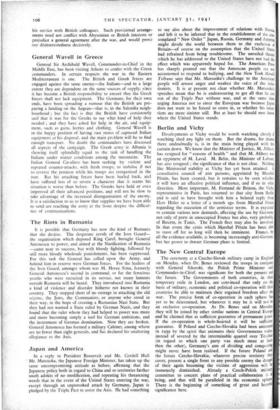The Riots in Rumania
It is possible that Germany has now the kind of Rumania that she desires. The desperate revolt of the Iron Guard— the organisation which deposed King Carol, brought General Antonescu to power, and aimed at the Nazffication of Rumania —came near to success, but with bloody fighting, followed by still more bloody wholesale punishments, has been suppressed. For this task the General has called upon the Army, and behind him in reserve were German forces. For the leaders of the Iron Guard, amongst whom was M. Horea Sima, formerly General Antonescu's second in command, or for the ferocious youths who were recruited in its service, not many laments outside Rumania will be heard. They introduced into Rumania a kind of violence and disorder hitherto not known in their country. They stopped short of no outrage in attacking the old regime, the Jews, the Communists, or anyone who stood in their way, in the hope of creating a Rumanian Nazi State. But they had not wanted a State ruled by German Nazis, and they found that the ruler whom they had helped to power was more and more becoming simply a tool for German ambitions, and the instrument of German domination. Now they are broken. General Antonescu has formed a military Cabinet, among whom are no fewer than eight generals, and has declared his unaltering allegiance to the Axis.






























 Previous page
Previous page